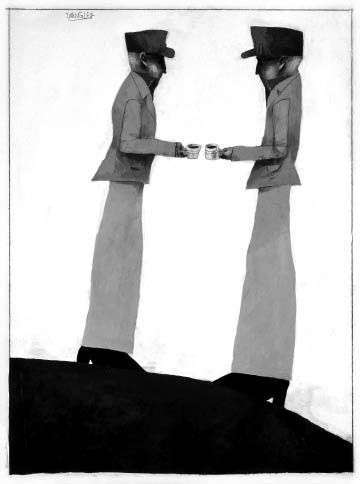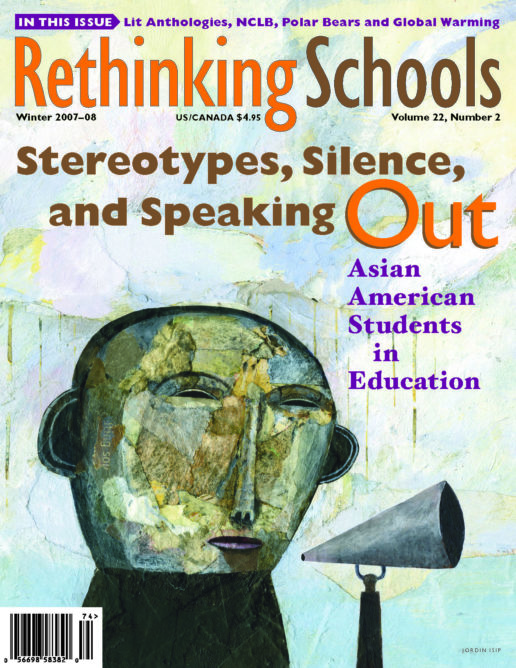Editorial Winds of Change
Illustrator: Jonathan Twingley

In May 2005, Spelman College in Atlanta presented Howard Zinn with an honorary degree. It must have been a sweet moment for Zinn, who had been fired as chair of the history department at Spelman in 1963 for “insubordination,” because he joined his students in the movement against racial segregation. At the commencement address, he told Spelman graduates, “The lesson of that history is that you must not despair, that if you are right, and you persist, things will change. The government may try to deceive the people, and the newspapers and television may do the same, but the truth has a way of coming out. The truth has a greater power than a hundred lies.”
Zinn’s message resonates for those of us who feel despair about attacks on public education, the war in Iraq, the erosion of civil liberties, the health care emergency, and the escalating climate crisis. Movements begin in living rooms, church basements, faculty rooms, union halls, and coffee shops where people insist, “Something has to change.” We are witnessing the seeds of those movements emerge: a November 2007 Washington Post/ABC News poll found that 75 percent of Americans want the country to take a different direction; only 23 percent wanted to “keep the country moving in the direction Bush has been taking us.” People no longer believe the lies about weapons of mass destruction or the rhetoric touting security through war.
The President’s pronouncements be-come fodder for late night TV jokes. There’s a booming business in calendars and digital clocks that count down the days and minutes till Bush’s presidency ends.
But it’s more than anti-Bush sentiment that’s worth noting. Tens of thousands rallied against racism in Jena, La. Over the last two years, we’ve seen the birth of a national movement for immigrant rights, including students who have staged walkouts at schools throughout the country.
Increasingly, students, teachers, and activists are challenging military recruitment abuses-most recently when over 70 students at Morton West High School in Illinois staged a protest against the Iraq War and military recruitment. There’s been an historic leap in global awareness and activism about the dangers and deep roots of the climate change crisis. On the consumer front, the “green and local” coalitions are changing marketplace practices as people demand toxic-free food and sustainable building materials; the number of local farmers markets has doubled in just the last 10 years.
And in October in San Francisco, 1,200 social justice teachers gathered to share teaching strategies and ideas on education activism at a conference sponsored by the S.F. Teachers 4 Social Justice. Participants talked about ways to confront NCLB and top-down mandates that rob our students of authentic and joyful learning and drain the time and energy of teachers who want to be more than the robotic hands of textbook companies.
Teachers for social justice groups are rising up in cities and small towns across the country: New York City and Tacoma, Wash.; Portland, Ore., and San Francisco; Los Angeles and Seattle; Chicago and Olympia, Wash.; Boston and St. Louis; Milwaukee and Louisville. They are forming study groups to take back their classrooms, and holding strategy talks about resisting standardized testing and pacing guides. They are no longer looking for ways to teach between the cracks of scripted curriculum. They are putting the scripts down and writing their own.
What we see and hear from these teacher groups is that the empty language of corporate-driven education reform has been exposed. Just as invasion, war, and occupation have not been routes to peace and democracy in Iraq, more and more of us now realize that “standards,” rote curriculum, tests, and sanctions have not been passages to educational equality.
At an English language learner conference, a teacher from the L.A. area said, “In the last five years, our school has been dismantled by textbook adoptions and testing and mandates. Our program is the only one that remains intact because we stood our ground. But the reason that I think they didn’t touch us was because we had the power of large numbers of teachers and the L.A. Writing Project standing with us.”
And that’s the message. When we feel small, when we feel that the corporations or the government are too big and too strong, we give away our power.
Teachers, parents, students, and community members need to come together and talk back to school districts who make textbook and testing companies fat on meager school budgets. Perhaps we need to start acting like the garment workers in the early twentieth century who, Howard Zinn tells us, read Shelley’s poem “The Mask of Anarchy” aloud to each other:
Rise like lions after slumber
In unvanquishable number!Shake your chains to earth, like dew
Which in sleep had fallen on you-
Ye are many; they are few!

